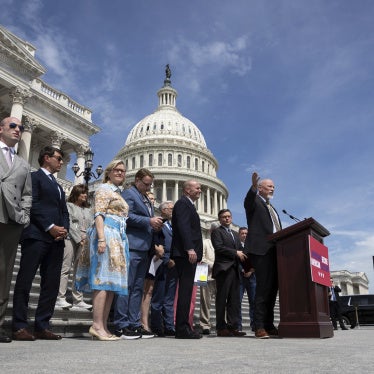(New York, December 18, 2000) President Bill Clinton should join the United States' closest allies by
signing the treaty for an international criminal court before the deadline of December 31st, Human
Rights Watch urged today.
French President Jacques Chirac, who is visiting Washington today, is expected to urge Clinton to sign the treaty. The European Union, whose members all strongly support the court, is concerned that the United States not be left out of this major new international institution.
One hundred and twenty governments, including virtually all of the U.S.'s closest allies, have already signed the International Criminal Court treaty, and 25 have already ratified. After the December 31st deadline for signing, states will only be able to participate in the court by ratifying the treaty. That would be very difficult for the United States because Senator Jesse Helms, among others, has said that he would not permit ratification to go forward.
"By signing this treaty President Clinton will be taking an historic step for global justice," said Richard Dicker, director of the International Justice program at Human Rights Watch. "The President cannot stop human rights abuse after he leaves office, but he can help ensure that future victims have a place to turn for justice. That would be a legacy worth leaving."
The International Criminal Court will try future cases of genocide, crimes against humanity, and war crimes. The court is the most significant international tribunal since the courts established to try Nazi leaders after World War II, and the most important advancement in human rights protection since the 1948 Universal Declaration of Human Rights.
President Clinton has supported more limited international criminal tribunals for Yugoslavia, Rwanda, Cambodia, Sierra Leone, and Iraq. In a speech to survivors of Rwandan genocide in 1998, President Clinton said, "Talks are under way at the United Nations to establish a permanent international criminal court. Rwanda ... underscores the need for such a court. And the United States will work to see that it is created."
The pace of signature and ratification of the treaty has picked up speed in the last six months, and Human Rights Watch anticipates that sixty states will have ratified by mid-2002. Sixty ratifications will bring the treaty into force and trigger the establishment of the court.
"The question is not whether this court will be established," said Dicker. "The court has tremendous support all around the world. The question is whether the United States will endorse it, and that decision rests with President Clinton alone."
The court is designed with numerous safeguards to protect the rights of the accused and guarantee the highest standards of due process. Under the court's "complementarity" provisions, the U.S. government can ensure that no American ever be prosecuted before the court, by conducting good-faith investigations - and prosecutions, if necessary - of any U.S. citizens who might commit such terrible crimes.








